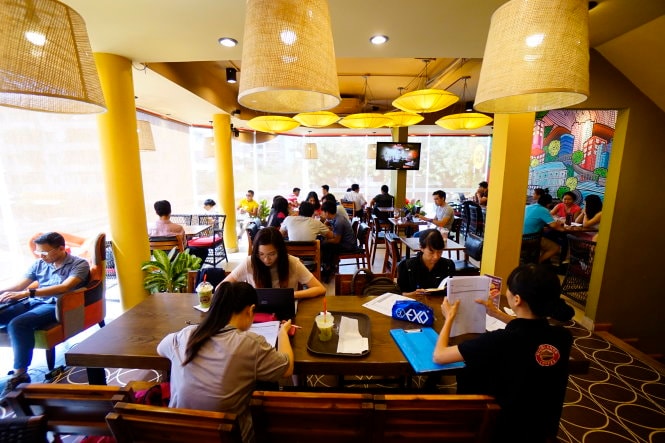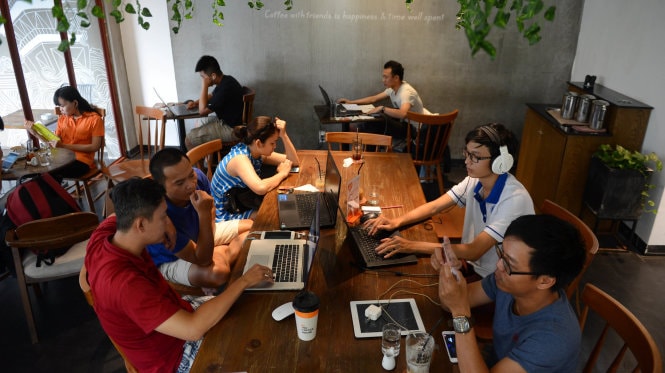Allow employees to work remotely
In Ho Chi Minh City, some technology companies or those with information technology applications have made significant changes in allowing employees to work remotely, although there has not been a specific, clear policy.
 |
| Many young people work on computers at a coffee shop in Phu Nhuan District, Ho Chi Minh City. Photo: Quang Dinh |
At many media companies today, leaders of some departments and groups within the company have allowed employees to work from anywhere, without necessarily having to sit in the office.
Increase efficiency, reduce costs
Many people will be surprised to hear Mr. Vu Minh Tri, General Director of Microsoft Vietnam, say that sales staff are required to not sit in the company for more than 3 hours per week. This is quite understandable because the main working environment of sales staff is to "rush out on the street" instead of sitting in an office with a desk and air conditioning.
However, managing employees based on actual performance instead of time is considered a strong move by this company with the leading working environment in Vietnam.
Ms. Thanh Tam, a specialist at a media company in District 1, said: “Work efficiency is number 1, and the working space is not important. Therefore, I still let my employees freely choose their working location, even at home.”
Similarly, Ms. Thu Ha, an editor of an online newspaper, said that her agency allowed her to work from home instead of having to go to the office every day. “Because the nature of the work can be handled anywhere, at any time, I am allowed to work from home without having to go to the office, as long as the work efficiency is guaranteed,” Ms. Ha shared.
Meanwhile, according to the survey results called Asia Workplace 2020 Study published by Microsoft in March 2017, employees in Vietnam do not feel empowered to grasp the needs of working in the digital space.
Specifically, 90% of Vietnamese people participating in the survey said that they are "mobile workers" and work outside the office takes up 20% of their time. "Mobile workers" or those who work outside the office need the company's support in providing working solutions, accounts to access the company's computer system, and connections to work social networks for group work, discussions, etc.
Mr. Vu Minh Tri shared: Currently, a number of foreign enterprises in Vietnam as well as domestic enterprises have deployed a mobile working model on the cloud computing platform. The company only needs to deploy the solution through mobile applications installed on employees' devices. Employees can access remotely via the Internet connection to help optimize work as well as provide timely support when problems need to be handled...
Sales and marketing staff do not need to be in the office all the time, can do remote reporting and manage locations via GPS. At that time, businesses can reduce operating costs after optimizing work processes, and employees also have more efficient working conditions because they can work anywhere, anytime.
 |
| Many young people like to work in open offices, coffee shops and are supported by information technology applications. Photo: Quang Dinh |
Incentive bonus
Mr. Nghia, an employee of KPMG in Ho Chi Minh City, said that for many years his company has implemented the Feel Good Friday program, in which the highlight is the program that allows employees to work anywhere.
Accordingly, on Fridays, the company's employees only work in the morning at the office. After lunch, employees are free to choose their own workplace, and can go home or to a coffee shop... The program is applied for two months each year and sometimes extended during special occasions of the company. The management considers it as a reward to encourage employees in the company.
Mr. Paul Huynh, KPMG's human resources director in charge of the Vietnam, Cambodia and Asia-Pacific markets, said the surprising thing when implementing the above program was the response from employees in the company and the more positive evaluation of work performance.
The number of employees registering to work from home has doubled, many people see clear results, it is not necessary to be present in the office to work effectively.
“The program was implemented to give employees the opportunity to work wherever they want, with a flexible working time policy, creating a fun, friendly, and open corporate culture. We found the program to be really successful when some of our partners contacted us to ask for experience in implementing it, which was a very good spread” - Mr. Paul Huynh said.
Currently, the work from home model is implemented by many businesses in Vietnam as an activity to build corporate culture as well as retain talent.
In an interview with Tuoi Tre, Mr. Vo Quang Hue - General Director of Bosh Vietnam - said that Bosh has applied the policy of working from home and flexible working hours to create a friendly environment for employees for several years now. The results have been beyond expectations, most employees are satisfied, and work productivity has increased significantly.
 |
| Mr. Nguyen Ngoc Tuong - Deputy Head of the Traffic Safety Committee of Ho Chi Minh City. Photo: TT |
Support remote work to reduce traffic congestion
Mr. Nguyen Ngoc Tuong, deputy head of the Ho Chi Minh City Traffic Safety Committee, said allowing employees and civil servants to work remotely is a way to reduce the number of private vehicles participating in traffic during rush hours, contributing to effectively reducing traffic jams.
However, this option should only be applied to private, non-state enterprises. These enterprises arrange and assign work to ensure employee productivity and business quality.
As for government agencies and units, it is very difficult to apply remote working. For example, teachers, doctors... cannot avoid going to the office.
According to Tuoi Tre


